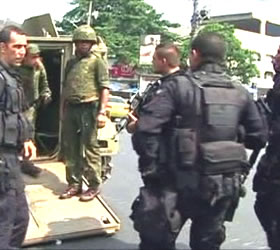 Police in Rio de Janeiro, Brazil, say they now have total control of the Vila Cruzeiro shanty town, as they continue a crackdown on violent drug gangs.Security forces earlier deployed armoured vehicles, transporting armed police, into Vila Cruzeiro, in the north of the city.The offensive comes after five days of clashes which have killed at least 30 people.Eight people of those were killed in Thursday’s push, authorities said.In response to the police operation gangs have been setting up barricades, burning vehicles and opening fire, officials said.Officials said that drug traffickers had regrouped in Vila Cruzeiro after being expelled from other shanty towns in the city.Jose Beltrame, the state’s Public Safety Director, said state police would receive additional support from federal law enforcement, in order to hold on to Vila Cruzeiro.He told reporters that police were in Vila Cruzeiro, “and we’re not leaving”.
Police in Rio de Janeiro, Brazil, say they now have total control of the Vila Cruzeiro shanty town, as they continue a crackdown on violent drug gangs.Security forces earlier deployed armoured vehicles, transporting armed police, into Vila Cruzeiro, in the north of the city.The offensive comes after five days of clashes which have killed at least 30 people.Eight people of those were killed in Thursday’s push, authorities said.In response to the police operation gangs have been setting up barricades, burning vehicles and opening fire, officials said.Officials said that drug traffickers had regrouped in Vila Cruzeiro after being expelled from other shanty towns in the city.Jose Beltrame, the state’s Public Safety Director, said state police would receive additional support from federal law enforcement, in order to hold on to Vila Cruzeiro.He told reporters that police were in Vila Cruzeiro, “and we’re not leaving”.
Some 17,500 police officers have been deployed to try to stop the violence.According to the government most of the victims of the violence are drug dealers, reports the BBC’s Julia Carneiro in Rio de Janeiro.But innocent people have also been killed, including a 14-year-old girl and a 62-year-old lady, our correspondent adds.Some 150 members of the Special Police Operations Battalion (Bope) and the military police force, backed up by the navy’s armoured vehicles, began arriving in Vila Cruzeiro at lunchtime on Thursday, Brazilian media reported.”The aim of the operation is to arrest the people behind the attacks in the city,” the head of Rio’s military police, Col Alvaro Garcia, said.
“We’re acting to reassure the population.”More than 150 suspects have been arrested in the raids at nearly 30 shanty towns in the northern and western parts of Rio since the weekend, when the latest wave of violence erupted.Heavily armed men have been stopping cars and buses, robbing passengers and setting vehicles alight.Residents of the hillside community said they did not know when life would return to normal.”What am I going to do? I can’t go to work, I can’t go home,” Maria das Gracas Fonseca, who works as a cleaner, told the Associated Press news agency.Her seven-year-old son and eight-year-old daughter had no school and no one to take care of them, she said.”I need the work, but my children are more important. I don’t even know where we’ll sleep tonight, but I will be with them,” she told AP.Rio’s favelas have for years been controlled by heavily armed drug-trafficking gangs.The city’s pacification programme is aimed at improving security and the rule of law in the run-up to Brazil’s hosting of the football World Cup in 2014 and Rio’s staging of the Olympic Games two years later – Bbc











